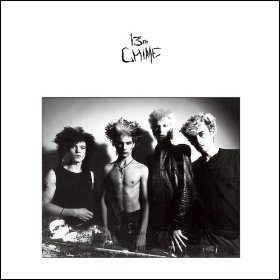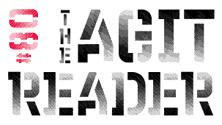
The Lost Album
Sacred Bones
As you should know, last year Sacred Bones released a collection of singles and whatnot from goth-tinged post-punks 13th Chime. The collection spanned 1981 to 1983, most of the lifespan of the band, and was for many (myself included) the first time hearing, or even hearing of, the group. In England during their time, though, they received airplay from John Peel and distribution for their three singles from Rough Trade. They even had the notoriety of having their coffin speaker cabinets made by the Groundhogs’ Tony McPhee.
As it turns out, that compendium was only half the story. Part two is this: The Lost Album. By 1983, the band was gaining recognition playing shows with the Dead Kennedys and Spear of Destiny. A tape of the band made it into the hands of Miles Copeland, the head of IRS Records, and Copeland came to see them perform at the 100 Club. He subsequently gave them a week of time in the IRS studios in Kensington to record what the band thought would eventually be an album for the label. IRS ended up declining, and the 13th Chime would disintegrate over the next year or so, the album’s master tapes being misplaced somewhere along the line.
Fortunately cassettes of those sessions remained to become The Lost Album. (Both the singles collection and The Lost Album can be had on CD as The Complete Discography.) In many ways, the 13th Chime seem very much of the time from which they sprang but also exemplary of it. Their dramatic vamping seems date-stamped, but where many of their lesser, but better known, contemporaries only had a song or two in them, the Chime doesn’t falter through the record’s nine cuts (nor on last year’s collection).
Leadoff track “Two As a Couple” could have easily been a hit, or at least an underground anthem. Mixing a steely guitar sound with xylophone accents and voodoo vocals, it’s the midpoint between Bauhaus and Specimen. I’m not sure what IRS was thinking, as this record would have fit in nicely between label offerings of the time like the Lords of the New Church and Alternative TV. “Fire” has a near-metallic riff and thundering drums, that when juxtaposed with Mick Hand’s Stardusted howl, make for the kind of harrowing requiem that the blank decade that was the ’80s needed. And come to think of it, it’s just sort of thing that the 21st century calls for too.
Stephen Slaybaugh
PAST PERFECTS
Jawbox, For Your Own Special Sweetheart
Interference, Interference
U2, The Unforgettable Fire
Isaac Hayes, Shaft
Pylon, Chomp More
Nirvana, Bleach
Harmonia and Eno '76, Tracks and Traces
Fela Kuti, The Best of the Black President
Siouxsie and the Banshees, Juju
Gary Higgins, Seconds
Where the Action Is! Los Angeles Nuggets 1965-1968
Big Star, Keep an Eye on the Sky
Sunny Day Real Estate, Diary and LP2
The Feelies, Crazy Rhythms and The Good Earth
